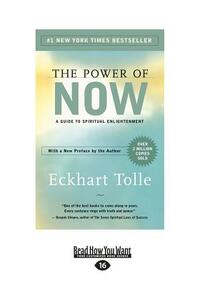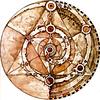Take a photo of a barcode or cover
slow-paced
challenging
emotional
informative
reflective
medium-paced
hopeful
informative
inspiring
slow-paced
I really enjoyed the beginning but the theological references got out of hand. The back of the book says “Eckhart Tolle is a contemporary spiritual teacher who is not aligned with any particular religion or tradition.” However, I feel like some theological background or understanding is assumed in his words and tone. I was lost when he said don’t make nothing something and observe nothing. Observing it seems to make it something, so then I found the audio book on spotify and followed along to him reading aloud. This book has honestly been making me so upset because its reputation gave me high expectations and I couldn’t connect with it past the first 100 pages but wouldn’t let myself start a new book and didn’t want to read the other book I put on pause so it put me in a slump. Ultimately I placed myself in the slump because I could have just found a book I to enjoy.
informative
reflective
slow-paced
hopeful
informative
inspiring
mysterious
fast-paced
Context: Someone who reads a lot of mental health books and spirituality books, for my own emotional reasons.
I think this book has two incredibly practical, well-expressed, and well-structured beginning and ending sections, but I find the middle sections either unrelatable or the kind of suspect co-option of religious statements in ways that aren't particularly actionable.
I admit that a lot of the book addresses the kinds of things I normally find suspicious about self-help books, that makes me think this is an actually useful book rather than trying to form some kind of addictive course material for desparate people. The book encourages people to sit and think about the book content, to not just read over it, but emotionally reflect on the text. The book acknowledges that it is going to pull in religious concepts from various Christian and Buddhist sources for evocative reasons.
The first 130 pages I think are very good; the core of it is a great expression of a core idea you will find in mental health, mindfulness, and many buddhist resources, which is a core to emotional stability is about
1. grounding one's self in the present
2. accepting that being connected with one's body is an important part of mental and spiritual well-being
3. that focusing too much on the past or present will lead to anxiety, whereas centring one's self on the current moment enables you to move forward with less tension.
4. Acknowledge that you are in the present situation, emotionally accept that, and then figure out how to either accept, change, or escape the situation.
I think it is expressed well, and it puts a great motivating framework around a lot of the practices one can learn in therapy or other guiding resources. For people who want some kind of systematic framework around this practice, I think this book provides a form that is easy to engage with without feeling like a bunch of complicated practices.
The last part of the book takes this framework and applies it to relationships and dealing with the external world (say trying to take on the burden of a chaotic world full of suffering).
For these parts alone, I will keep this book around as a great reference and primer.
Now the criticisms, from mild to serious:
This book, while I think it is a great retelling of a corpus of well-trodden wisdom, doesn't have anything particularly new or novel. This being said, this book is 25 years old now, and possibly preceded a lot of the rich materials we now have (and possibly owe Tolle for popularizing)
I roll my eyes at a lot of the co-option and bastardizing of the religious concepts because, from a historical and literary criticism view of religious texts that tries to place them in the context of their time, a lot of the "interpretations" in this book are an incredible stretch that produce a dangerous conspiracy-theory-friendly view that all religious are derived from some core unified truth.
This being said, I have to admit that kind of people who crave this woo desire this kind of woo, and if the woo is being used to lead them to a healthier mental health outlook, I can live with that (and it isn't obviously clear to me that Tolle is abusing his influence beyond the life goal of being famous, successful, and prosperous. I haven't seen him put out anything I can cynically view as an intentional and careless cash grab.)
I found the middle section of the book, which really goes into some kind of "umanifested self", as some kind of psychospiritual reiterating of the useful practical earlier parts of the book in some kind of cosmological setting. I didn't see anything particularly malignant about it; there's no promise that the work will be easy, or that following the practices in this book will help you avoid to deal with the struggles and tragedies of life.
I wish, however, that rather than producing this narrative about the promise of some kind of enlightened and purely-thought state of living, that the book focused on the practical goal of trying to deal with life in a graceful and positive way.
Again, this might be meeting its intended audience on its own terms; I appreciate that the book acknowledges that it's not attempting some kind of scientific authority, and just challenges you to try the practices and see if you feel better doing it.
I highly recommend reading the first 120 or so pages of the book, as I think it will tie well to a lot of therapeutic advice and it might provide motivations for grounding techniques, calming one's self down when stressed, and so on. Maybe people will find the rest of the book relatable, but as far as woo-woo self-help books go, I feel this one is generally helpful for people who need it expressed this way.
Personally I think that this book combined with The Language of Emotions: What Your Feelings Are Trying to Tell You provides a pretty good general-purpose framework for dealing with adversity and emotional tension in one's life.
medium-paced
slow-paced
Didn’t finish cas homeboy got religious rather than spiritual


